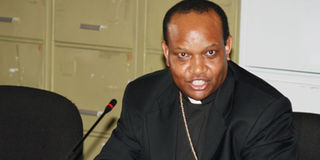Team vets three more JSC nominees

Bishop Anthony Muheria appears before the Parliamentary Committee on Legal Affairs for vetting to join the Judicial Service Commission at Parliament Buildings November 24, 2010 . WILLIAM OERI
The government's employment agency head, a Catholic bishop, and a former MP have been interviewed by Parliament’s Justice and Legal Affairs Committee as it concluded its work of vetting nominees to spearhead judicial reforms.
The chairman of the Public Service Commission, Mr Titus Gateere, the bishop of Kitui Diocese Anthony Muheria and former Butula MP, Prof Christine Mango, met the House committee in marathon interviews that lasted an hour each for the candidates.
The three now join presiding appellate Judge Riaga Omollo, lawyers Ahmednassir Abdullahi and Florence Mwangangi in the list of those awaiting Parliament’s approval.
High Court Judge Isaac Lenaola and principal magistrate Emily Ominde, were the first to be appointed to the commission after they got the nod from Parliament.
Mr Gateere had a smooth ride through the interview as he explained his successes with the Public Service Commission reforms as a pointer of his vision towards the Judiciary.
The public service boss said that though he has been a member of the JSC, his voice was not heard because he was perhaps alone.
“Lawyers talk about justice delayed, being justice denied. I want to see a Judiciary that lives by that credo,” said Mr Gateere.
He said that his only brush with the law was “perhaps a traffic ticket but nothing serious".
Mr Gateere added that he had no political preference and that he “doesn’t like politicians".
Bishop Muheria was the second nominee to be vetted and found himself in an awkward position to talk about the pre-referendum debate on abortion and Kadhi courts.
The committee chairman Ababu Namwamba and nominated MPs Amina Abdalla and Rachel Shebesh questioned Bishop Muheria on how he’ll handle Kadhi courts and the pro-life versus pro-choice debates bearing in mind the strong opposition of the Church against the two issues.
The bishop said he’ll judge people to the Kadhi courts based on their “person and not faith”, because that’s where fairness emanated from.
“The issue of pro-choice and pro-life is a matter of jurisprudence that emanates from natural law, leave alone the doctrine of the church,” said Bishop Muheria. “This is a much-debated topic even in the legal world.”
He added that he won’t let the church’s stand taken before the referendum cloud his judgment.
“I do believe it’s not worth debating what was said or what wasn’t. We’re past that stage,” he said.
The Bishop said that should it come to a point when he’ll be forced to make decisions that strongly contradict his philosophical and religious leanings, then he would go for the “opportunity to abstain”. However, like Mr Gateere, Bishop Muheria said he had a vision of a Judiciary where justice and fairness prevailed, and where there was no room for corruption.
He said his major input in the JSC will be to curb favouritism, if it exists, but then again he pledged ignorance on the inner workings of the Judiciary, while at the same time expressing willingness to learn the intricacies.
Apart from traffic offences, the Bishop told the committee that he’s never had a brush with the law. Bishop Muheria’s name was forwarded to the committee by President Kibaki.
Prof Mango, a nominee of the Prime Minister Raila Odinga, and a staunch member of ODM had to convince the committee that his political affiliations would not jeopardise the commission’s integrity.
“What’s the assurance that justice will be blind in your hands and that you’ll not look at justice through political blinkers?” posed Mr Namwamba, an ODM MP.
Prof Mango, a career scientist who retired into politics replied: “I am being brought in as a lay woman, to see things through that lens. My vote will always be with the public interest in mind.”
The names are set to be tabled in Parliament soon.




